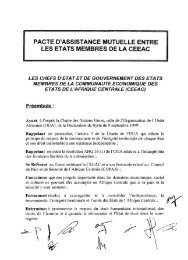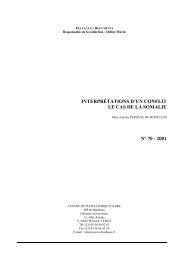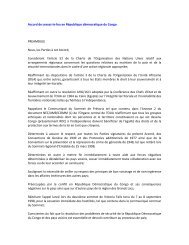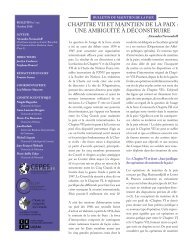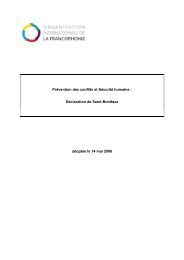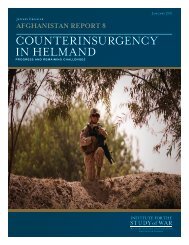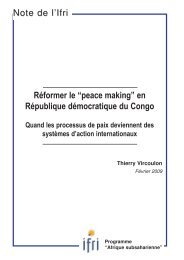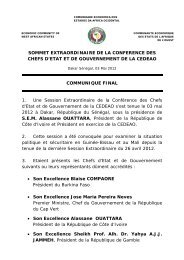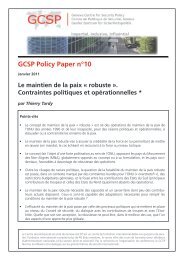Violences sexuelles des casques bleus : Défis et réalisations pour ...
Violences sexuelles des casques bleus : Défis et réalisations pour ...
Violences sexuelles des casques bleus : Défis et réalisations pour ...
Create successful ePaper yourself
Turn your PDF publications into a flip-book with our unique Google optimized e-Paper software.
<br />
P a g e | 44 <br />
qu’elle valorise chez ses hommes <strong>et</strong> ses femmes » 49 . C’est un acquis du processus<br />
de socialisation <strong>des</strong> individus. Le genre définit l’identité sociale, les manières de<br />
réagir, les rôles, l’accès aux ressources, les attentes sociales, les positions relatives<br />
dans la société, le contrôle <strong>des</strong> moyens de production, la division du travail, les<br />
besoins, les forces <strong>et</strong> les vulnérabilités de chaque sexe :<br />
Gender refers to the socially constructed roles as ascribed to<br />
women and men, as opposed to biological and physical characteristics.<br />
Gender roles vary according to socio-economic, political and cultural<br />
contexts, and are affected by other factors, including age, race, class and<br />
<strong>et</strong>hnicity. Gender roles are learned and are changeable. Gender equality<br />
is a goal to ensure equal rights, responsibilities and opportunities of<br />
women and men, and girls and boys, which has been accepted by<br />
Governments and international organizations and is enshrined in<br />
international agreements and commitments 50<br />
Gender power is seen to shape the dynamics of every site of<br />
human interaction, from the household to the international area. It has<br />
expression in physique, how women’s and men’s bodies are nourished<br />
trained and deployed: how vulnerable they are to attack; what mobility<br />
they have. It has expression in economics – how money, property, and<br />
social sphere – who has initiative in the community and authority in the<br />
family, who is dependent? 51<br />
C<strong>et</strong>te sensitivité face au genre perm<strong>et</strong> donc de distinguer les différentes<br />
expériences, besoins, forces, habilités, cultures, faiblesses, expressions <strong>et</strong> positions<br />
<strong>des</strong> femmes <strong>et</strong> <strong>des</strong> hommes dans une société donnée, mais aussi de comprendre<br />
les relations de pouvoir genrées <strong>et</strong> de voir comment elles forment les institutions 52 .<br />
En bref, le genre définit les implications sociales (rôles, responsabilités,<br />
devoirs) d’être mâle ou femelle <strong>et</strong> comment les femmes <strong>et</strong> les hommes entrent en<br />
<br />
49 Rehn, Elisab<strong>et</strong>h <strong>et</strong> Sirleaf, Johnson, Women War and Peace, UNIFEM, 2002, p. 30.<br />
50 Women peace and security, Nations Unies, 2002, [En ligne],<br />
www.un.org/womenwatch/daw/public/eWPS.pdf (page consultée le 10 août 2008) paragraphe<br />
30.<br />
51 Cockburn, Cynthia, «The gendered dynamics of armed conflict and political violence» dans<br />
Moser, C. <strong>et</strong> Clark, F. Victims, Perp<strong>et</strong>rators or Actors? Gender, Armed Conflict and Political Violence.<br />
Zed Books, Londres, 2001, p. 15.<br />
52 Cockburn, Cynthia dans Moser, C. <strong>et</strong> Clark, F., Op.cit, p. 28.



